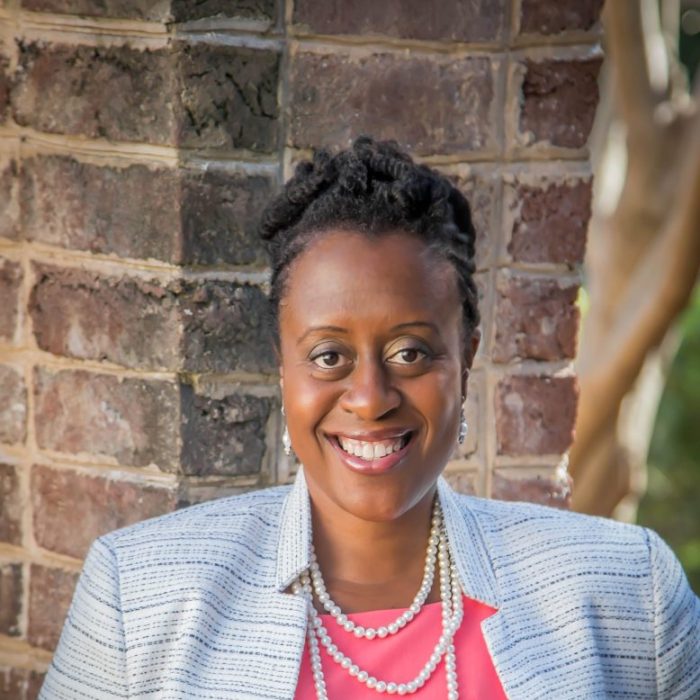Ayana Gabriel
So let’s stop playing this game so that we can build support systems and networks for everyone, and equitable opportunities and pathways for everyone, without acknowledging that some young people simply need more help getting access.
AYANA GABRIEL

I’m a program officer at The Arthur M. Blank Foundation, a family foundation in Atlanta, GA that works to transform the lives of children and families, especially those furthest from opportunity. We’re an unusual foundation in that we don’t just have grantmaking programs, we also oversee the corporate giving programs connected to the Atlanta Falcons, Atlanta United, Mercedes-Benz stadium, PGA TOUR Superstore and the Montana ranches.
I think that so much of my work with young people, social justice, communities, and equity reflects who I am and where I’ve been in my life. I was one of the first people in my family to go to college, Spelman, and I remember feeling so proud that we were able to afford a ticket for me to get there on a Greyhound bus. Then I get to college and meet other young people and I realize that there were so many different journeys people took to get to that college, and that not everyone got there on a Greyhound bus — some people got there in their own cars, some couldn’t afford that ticket.
After college I spent time as a chemical engineer, then as a middle-school teacher, and then eight years at Teach for America, as the director of diversity and education for admissions. All of these experiences, I bring into my work as a program officer.
I am passionate about STEM, and I want to see young people, and adults, and entire communities that are constantly struggling, have as many opportunities as possible for good jobs and economic mobility. That’s especially important in a city like Atlanta, where we have the unfortunate title of being the city with the most income inequality for our residents.
I’ve been involved in Equitable Futures and the conversations that led to the toolkit for the past year. Here’s how I would describe the lightbulb moment that led me to get involved with this work. I was at a conference in 2019 for funders that work in the education space, and I heard this presentation from Emily Lockwood, who opened a webinar, about the achievement gap of young people, particularly for Black and Brown and poor people, and then she presented some data on how people actually get jobs.
For me, that was a moment of clarity and honesty about what we’re really dealing with, when we are trying to help children and families and communities succeed. Equity is the main challenge. As the Equitable Futures research tells us, it’s really important to think about young people building social capital — which is just another way of saying that they need to build networks and connections in order to have the types of lives we all dream of having. But when you really look at the data — and you understand what’s going on in some zip codes in Atlanta — you understand, that some young people are not having trouble building their networks, because their parents or their aunt were able to use their networks on their behalf. Other young people, though, don’t get the same entry points to networks. So let’s stop playing this game so that we can build support systems and networks for everyone, and equitable opportunities and pathways for everyone, without acknowledging that some young people simply need more help getting access.
Since I first met Emily in 2019, a lot of good research has come out of Equitable Futures, and I want to see all of it. I share the research with everyone — I send out the latest decks and briefs to people like a manager of a community foundation I know, or to other funders. To me, the research has been a prompt for everyone who works in this space to do self-examination about whether we’re really doing what it takes to respect the agency of young people and give them the opportunities they need to have a good life.
Now that we have the toolkit, I think I’ll use the tools and resources like I’ve used the research so far: as a catalyst for the conversations and collaboration we’re having about economic mobility, and what it really takes to not operate in silos when doing this work. That’s the problem with so much of the funding and interventions out there: we act as if we can do this work in pieces. We won’t be effective if we support an intervention for young people that doesn’t take account of the world they live in, the adults who support them.
An example of how we’ve used this at the Blank Foundation is the CareerReady ATL youth apprenticeship program. Greater Atlanta is experiencing growth and prosperity that outpaces other metros, but it is not evenly shared, and the region is importing talent. Youth apprenticeship can be a powerful pathway to opportunity and equity. We’re working with United Way of Greater Atlanta to pilot a youth apprenticeship program that centers youth voice in the development and ongoing management of the system so that it reflects their needs and aspirations.



